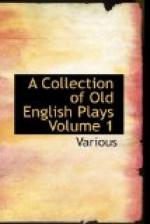“Here faire Enanthe,
whose plumpe ruddy cheeke
Exceeds the grape, it makes
this; here my geyrle.”
Petronius is speaking hurriedly. He begins to answer Enanthe’s question: “it makes this” (i.e. “means this"), he says, but breaks off his explanation, and pledges his mistress.
[86] 4tos. walles.
[87] 4tos. Ith.
[88] “Non cuivis homini contingit adire Corinthum.” Horat. Epist. i. 17, 36 ([Greek: ou pantos andros es Korinthon esth’ ho plous]).
[89] Quy. Th’old Anicean (sc. Anacreon).
[90] A paraphrase of Horace’s well-known lines:
“Linquenda tellus, et
domus, et placens
Uxor; neque harum, quas colis,
arborum,
Te, praeter invisas cupressos,
Ulla brevem dominum sequeter.”
—Odes, ii. 14, ll. 21-29.
[91] 4to. your.
[92] 4tos. thy.
[93] Cf. Horace, Od. i. 12, ll. 37, 38:—
“Regulum, et Scauros
animaeque magnae
Prodigum Paulum.”
[94] Vid. Tacitus, Ann. xi. 11; Sueton. Vit. Ner. 6.
[95] 4tos. have.
[96] 4tos. night.
[97] The punning on the fairies’ names recalls Bottom’s pleasantries (M.N.D. iii. 1), and the resemblance is certainly too close to be accidental.
[98] “Uncoth” here = wild, unfrequented; Cf. As You Like It, ii. 6, “If this uncouth forest yield anything savage,” &c.
[99] A “Hunts up” was a hunting song, a reveillee, to rouse the hunters. An example of a “Hunts up” may be found, set to music by J. Bennet, in a collection of Ravenscroft, 1614.
[100] Quy. “kind;” but our author is not very particular about his rhymes.
[101] “Rascal” was the regular name for a lean deer (As You like It, iii. 3, &c.).
[102] The whole scene is printed as verse in the 4to.
[103] This very uncommon word (French: legerete) occurs in Henry V. (iv. i. l. 23).
[104] More commonly written “cote,” a cottage.
[105] To “draw dry foot” meant to follow by the scent. (Com. of Errors, iv. 2.)
[106] No doubt the writer had in his mind the description of “Morpheus house” in the Faerie Queene (Book i., Canto I).
[107] “Whisht” (more commonly “whist”) = hushed, stilled. Cf. Milton, Ode on the Nativity:—
“The winds with wonder
whist
Smoothly the waters kist.”
[108] “Plancher” (Fr. planche) = a plank. Cf. Arden of Feversham, I. i. “Whilst on the planchers pants his weary body,” Shakespeare (Measure for Measure, iv. 1) has “a planched gate.”
[109] “Incontinent” = immediately. The expression is very common (Richard II., v. 6, &c.).
[110] These verses and Frisco’s “Can you blow the little horne”? are evidently fragments of Old Ballads—to be recovered, let us hope, hereafter.




